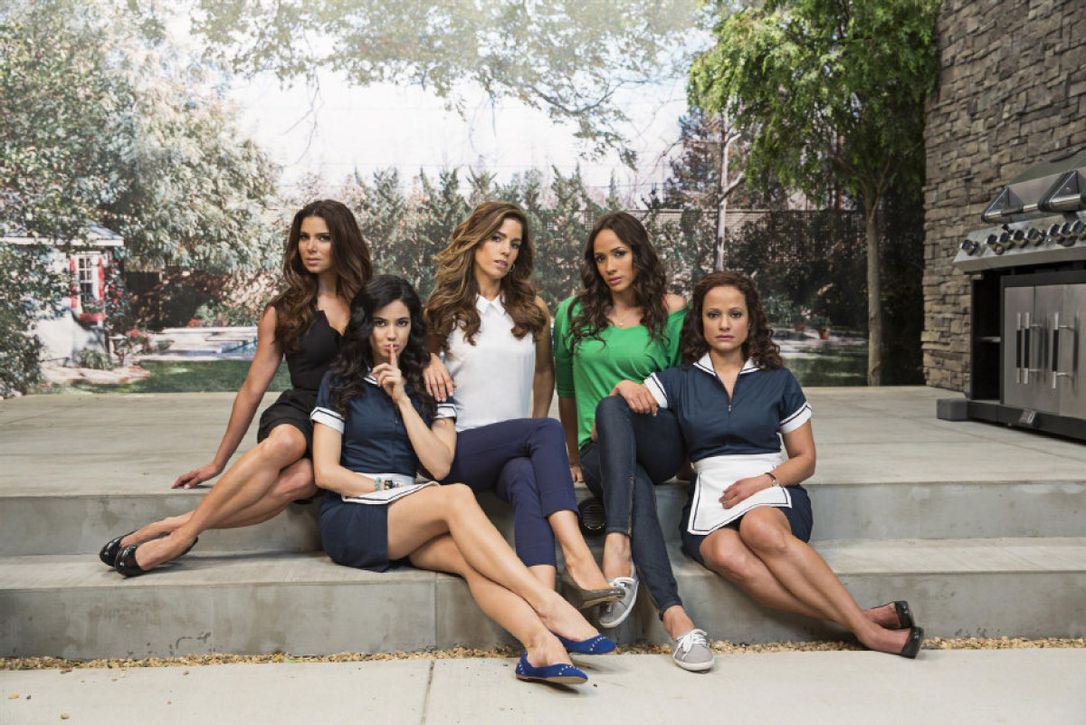Content warning: This article mentions issues regarding sexual violence in Devious Maids. There are no descriptions of sexually violent scenes.
When I started thinking about my thesis project, a memory of sitting with my mom watching Devious Maids flickered in my mind like a forgotten flashlight at the bottom of a junk drawer. Initially, I could only remember that it was a dramatic show because I was a 12-year-old child watching cartoons when the show first aired. Now with new batteries in the flashlight, I can recognize the powerful use of comadre energy flowing through the show’s narrative
Devious Maids aired on Lifetime from 2013 to 2016, the first all-Latina ensemble in an English-speaking network. For four seasons, this show followed the lives of four Latinas as they navigated their differing dreams and goals. When we met her, our principal heroine Marisol (Ana Ortiz) is an English Professor turned undercover domestic worker trying to prove her son’s innocence after he was arrested for the murder of Flora (Paula Garcés), a maid who worked in a lavish mansion in Beverly Hills. To find clues, Marisol becomes part of Flora’s friend group of other domestic workers. These comadres include the aspiring singer, known for her ambition, Carmen (Roselyn Sánchez), the undocumented Mexican trying to bring her son to the U.S. with her, Rosie (Dania Ramirez), and the sarcastic mother trying to provide her daughter with better opportunities, Zoila (Judy Reyes).
Devious Maids’ ensemble provides an opportunity to look at the relationships between Latinas. Moments where our central four talk, laugh, and gossip on park benches, grocery stores, and cafe tables are reminiscent of the well-known practice of comadrazgo. Researcher and psychologist Lillian Comas-Diaz explains this is a practice rooted in the act of co-mothering, aka being comadres, in which Latinas engage in activities and conversations with each other for comfort, advice, and general friendship. Yet even with comadres, there are tensions that can fall along lines of race, ethnicity, class, citizenship status, and sexuality. And Devious Maids explores that complexity.
From the start, Marisol seems to believe that she alone is her son’s last hope. While she does get some help and advice from a lawyer, Marisol is the one going undercover and putting herself in danger. She uses comadrazgo as a way of getting tidbits of information about the lives of the rich and powerful who are behind Flora’s death and the ensuing cover-up. But the other comadres, particularly Zoila, are not naive. They know something is wrong because they can feel Marisol breaking their trust as she keeps bringing up Flora and the investigation (not to mention the fact that they don’t even know Marisol’s true identity at the beginning).
The show – and sometimes our heroine herself – characterizes Marisol as different from the other Latinas. She speaks English at a scholarly level, she is successful enough to have her own big house, and she knows that once she gets the evidence she needs for her son’s release, she can leave. Marisol is the picture of acceptable hard work and success, so wouldn’t it make sense that she could solve this murder mystery alone? But the narrative entangled in the comadrazgo dynamic actually shows how important it is for Marisol to be vulnerable with her comadres and break away from her implicit perception of her superiority.
Marisol begins to move in this direction when she is confronted with the reality of all her prior jabs and prejudices against Flora. When Marisol wants to talk to Flora’s grandmother in the retirement home, Flora’s cousin stops her. Marisol mentions for the first time that she is trying to find justice for Flora, perhaps to appease what she assumes is a heartbroken and invested family. But then the cousin says, “Flora was an embarrassment to our family. She was a liar, thief, and a whore. And as far as I’m concerned, she already got what she deserved.” With this heated statement, Marisol is visibly shocked. Before this scene, Marisol, because her son was romantically involved with her, would often try to get her son to see that Flora was not a woman he should have loved. In other words, Flora to Marisol was a “liar, thief, and whore” even if she didn’t say those words exactly. Similarly, even if Marisol did not initially think she was doing anything wrong by getting intel through the comadres, she was guarding herself against and creating barriers with the comadres by lying to them for her own agenda.
When confronted with the words and attitude she had implicitly felt, the narrative moves to show that the sexual violence and subsequent death of Flora is a terrible crime that is not washed away or diluted because of Flora’s engagement with sex work. At this same part of the season, the other Latina characters start more openly defying their bosses, not just as a slight or for laughs. Like Flora, the other Latinas are not just side characters for a bigger story. They are integral and essential to the whole storyline because only the culmination of the group’s strength will catch Flora’s rapist and killer.
This comadre structure continues throughout the show’s run, serving both as a source of conflict and resolution. It reminds the viewer – Latinx or not – that Latinas are not a homogenous group, and therefore there will be inner tension and harm that corresponds with broader processes of discrimination, exclusion, and violence. Ultimately, Devious Maids portrays comadrazgo as a powerful space to see and work through our differences because communal strength comes from vulnerability.

